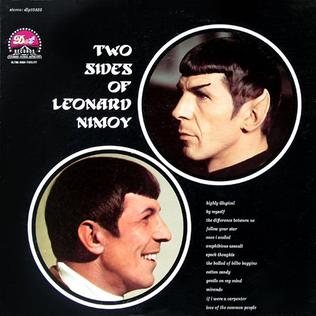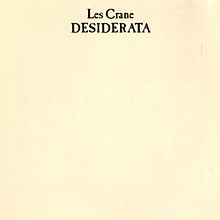"Desiderata" is a 1927 prose poem by the American writer Max Ehrmann. The text was widely distributed in poster form in the 1960s and 1970s.

Lizard is the third studio album by British progressive rock band King Crimson, released on 11 December 1970 by Island Records in the UK, and in January 1971 by Atlantic Records in the United States and Canada. It was the second consecutive King Crimson album recorded by transitional line-ups of the group that did not perform live, following In the Wake of Poseidon. This is the only album by the band to feature singer and bass guitarist Gordon Haskell and drummer Andy McCulloch as official members of the band.
"Deteriorata" is a comedy record released as a single in 1972. It is a parody of Les Crane's 1971 spoken word recording of "Desiderata", the early 20th-century poem by Max Ehrmann.

Les Crane was a radio announcer and television talk show host, a pioneer in interactive broadcasting who also scored a spoken word hit with his 1971 recording of the poem Desiderata, winning a "Best Spoken Word" Grammy. He was the first network television personality to compete with Johnny Carson after Carson became a fixture of late-night television.
"Desiderata" is an early 1920s poem by Max Ehrmann.

"No More Rhyme" is a song by American singer-songwriter and actress Debbie Gibson. The song was released as the third single from her sophomore studio album Electric Youth (1989) only in North America, Australia, and Japan. Like all of the album, the song was solely written by Gibson. Frequent collaborator Fred Zarr produced the song. "No More Rhyme" was not issued a single in Europe, where the next single "We Could Be Together" was released instead. The song is a pop ballad.

"Oh Girl" is a song written by Eugene Record and recorded by American soul vocal group the Chi-Lites, with Record on vocals and also producing. It was released as a single on Brunswick Records in 1972. Included on the group's 1972 album A Lonely Man, "Oh Girl" centers on a relationship on the verge of break-up.

"(Your Love Keeps Lifting Me) Higher and Higher" is an R&B song written by Gary Jackson, Raynard Miner, and Carl Smith. It was recorded by Jackie Wilson for his album Higher and Higher (1967), produced by Carl Davis, and became a Top 10 pop and number one R&B hit.

"Another Saturday Night" is a 1963 hit single by Sam Cooke from the album Ain't That Good News. The song was written by Cooke while touring in England when staying in a hotel where no female guests were allowed. It reached No. 10 on the Billboard Hot 100 and was No. 1 on the R&B chart for a single week. In the UK, the song peaked at No. 23 on the UK Singles Chart.

"Love Ballad" is a song by R&B/Funk band L.T.D. Jeffrey Osborne is the lead singer.

"Be Thankful for What You Got" is a soul song written and first performed by William DeVaughn. The record sold nearly two million copies on its release in spring of 1974, reaching #1 on the U.S. R&B charts and #4 on the Billboard Hot 100 chart. In 2021, it was listed at No. 374 on Rolling Stone's "Top 500 Greatest Songs of All Time".

"I've Got the Music in Me" is a pop song by the Kiki Dee Band, released in 1974. It was written in 1973 by Bias Boshell, Kiki Dee Band's keyboardist. It is also the title of a Kiki Dee Band album released in 1974 and re-mastered and re-issued with bonus tracks in 2008.

"Spinning Wheel" is a song from 1968 by the band Blood, Sweat & Tears, written by Canadian lead vocalist David Clayton-Thomas and appearing on their eponymous album.

"My Melody of Love" is the title of a popular song from 1974 by the American singer Bobby Vinton. Vinton adapted his song from a German schlager song composed by Henry Mayer, and it appears on Vinton's album Melodies of Love. The song was also recorded by Spanish pop singer Karina as "Palabras de Cristal".

Two Sides of Leonard Nimoy is Leonard Nimoy's second album released shortly after Music from Outer Space. It was released in early 1968 by Dot Records and reached 97 on the US album chart.

"Heaven Must Have Sent You" is a song written by Brian Holland, Lamont Dozier, and Eddie Holland when at Motown, and first recorded by The Elgins in 1966. It was also a 1979 disco hit single by Bonnie Pointer.

"An American Dream" is a song written by Rodney Crowell. He recorded it under the title "Voilá, An American Dream" on his 1978 album Ain't Living Long Like This, and released it as the B-side to that album's single "(Now and Then There's) A Fool Such as I".

"I Woke Up in Love This Morning" is a song written by L. Russell Brown and Irwin Levine and recorded by The Partridge Family for their 1971 album, Sound Magazine. It went to number 13 on the Billboard Hot 100 in 1971; it hit number 4 in Canada.

"Swearin' to God" is a song written by Bob Crewe and Denny Randell. It was recorded by Frankie Valli and released in May 1975 as a single from his album Closeup. It is a love song whose lyrical hook is a more literal use of the expression "I swear to God" :
Frederick Henry Werner Jr. was an American musician and composer who wrote and arranged music for television, cinema, and Broadway musicals. He started his career in New York in the early 1960s working with Frank Loesser, Noel Coward, and Bob Fosse. Later, he moved to California to work in television and movies, eventually returning to Broadway. He was nominated for a Tony Award in 1964 for Best Conductor and Musical Director for the musical High Spirits. He is also known for his work on Les Crane's 1971 album Desiderata.
















